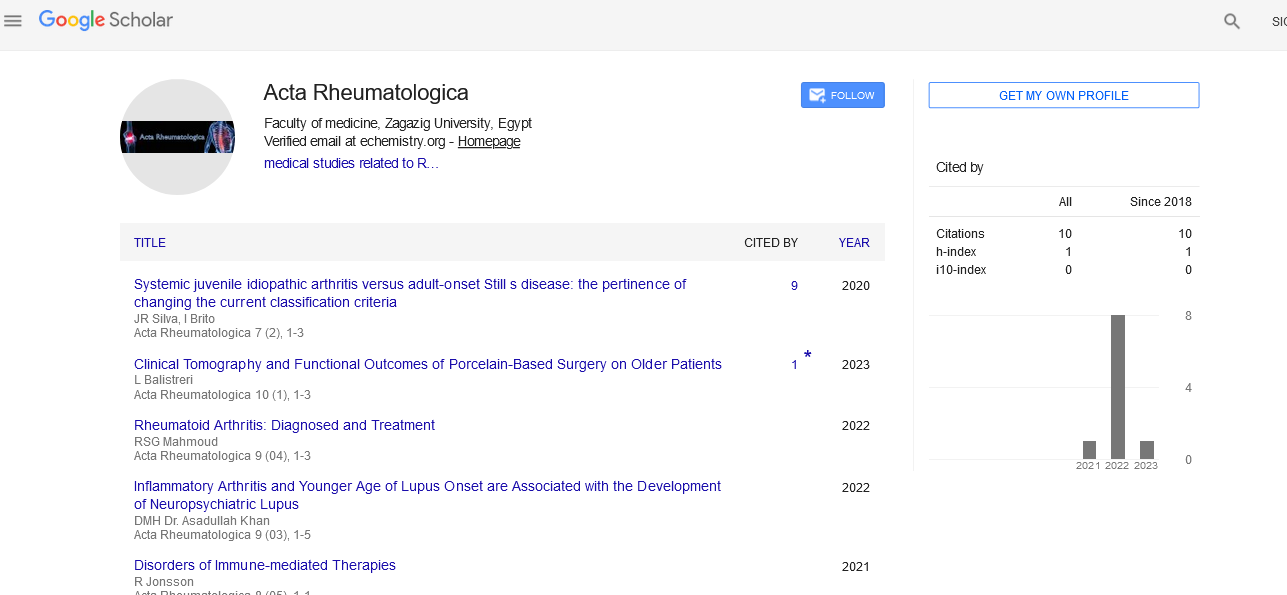Perspective - (2024) Volume 11, Issue 6
Immunogenicity of COVID-19 Vaccines in Rheumatic Disease Patients
Wang Weihong*
Department of Health Care, Jinan University, Guangdong, China
*Correspondence:
Wang Weihong, Department of Health Care, Jinan University, Guangdong,
China,
Email:
Received: 08-Nov-2024, Manuscript No. IPAR-24-15239;
Editor assigned: 12-Nov-2024, Pre QC No. IPAR-24-15239 (PQ);
Reviewed: 26-Nov-2024, QC No. IPAR-24-15239;
Revised: 06-Dec-2024, Manuscript No. IPAR-24-15239 (R);
Published:
13-Dec-2024
Introduction
The COVID-19 pandemic has profoundly impacted global
health, prompting rapid development and deployment of
vaccines. While the safety and efficacy of these vaccines in the
general population have been extensively studied, the
immunogenicity of COVID-19 vaccines in patients with rheumatic
diseases raises specific concerns. This article delves into the
immunogenicity of COVID-19 vaccines in this vulnerable
population, exploring the factors that influence vaccine response,
potential implications for treatment, and recommendations for
healthcare providers.
Understanding immunogenicity
Immunogenicity refers to the ability of a vaccine to provoke
an immune response. This response typically involves the
production of antibodies, activation of T cells, and the establishment
of immunological memory. A robust immunogenic response is
essential for effective vaccination, as it enhances protection
against the targeted pathogen-in this case, the SARS-CoV-2 virus.
COVID-19 vaccines overview
Several COVID-19 vaccines have received emergency use
authorization and full approval globally, including mRNA
vaccines (Pfizer-BioNTech and Moderna), viral vector vaccines,
and protein subunit vaccines. Each vaccine type generates an
immune response through different mechanisms, but all aim to
elicit both humoral (antibody-mediated) and cellular (T-cellmediated)
immunity against the virus.
Rheumatic diseases and immunosuppressive
treatments
Patients with rheumatic diseases, such as Rheumatoid
Arthritis (RA), Systemic Lupus Erythematosus (SLE), and psoriatic
arthritis, often require long-term immunosuppressive therapy.
Common treatments include corticosteroids, Disease-Modifying
Antirheumatic Drugs (DMARDs), and biologics that target
specific immune pathways. These medications can dampen the
immune response, raising concerns about the effectiveness of
vaccines.
Description
Factors affecting vaccine response in rheumatic
patients
Disease activity: Active disease may impact the immune
system's ability to respond to vaccination. Patients with
uncontrolled disease might exhibit a diminished immunogenic
response compared to those in remission.
Type of immunosuppressive therapy: Different medications
have varying effects on immune function. For instance,
corticosteroids can suppress T-cell activity, while biologics
targeting B cells may hinder antibody production.
Age and comorbidities: Older age and pre-existing health
conditions can influence immune responses to vaccines, further
complicating the picture for rheumatic disease patients.
Vaccine type: The platform of the vaccine (mRNA vs. viral
vector) may also play a role in determining the magnitude and
durability of the immune response.
Current research on COVID-19 vaccine
immunogenicity in rheumatic disease patients
Studies and findings: Emerging research has focused on
assessing the immunogenicity of COVID-19 vaccines among
rheumatic disease patients. Key findings include:
Reduced antibody response: Several studies have reported
that patients on immunosuppressive therapies tend to generate
lower levels of neutralizing antibodies compared to healthy
controls. For example, patients receiving rituximab, a B-cell
depleting agent, exhibited significantly diminished antibody
responses after vaccination.
T-cell response: While antibody responses may be blunted,
some studies suggest that T-cell responses can remain intact in
certain patient populations, potentially providing a level of
protection against severe disease.
Timing of vaccination: The timing of vaccination relative to
the administration of immunosuppressive therapies can affect
outcomes. Some guidelines recommend adjusting the timing of immunosuppressive treatments around vaccination to enhance
immune responses.
Third doses and boosters: Recent studies have highlighted the
potential benefits of administering additional vaccine doses for
individuals with compromised immune systems. These booster
doses have been shown to enhance antibody levels and improve
overall vaccine effectiveness.
Clinical implications
The findings regarding reduced immunogenicity raise
important clinical considerations:
Informed decision-making: Patients with rheumatic diseases
should be informed about the potential for a diminished vaccine
response. This knowledge can guide discussions regarding
vaccine choice, timing, and the necessity of booster doses.
Monitoring antibody levels: For high-risk patients, measuring
antibody levels post-vaccination may help assess individual
immune responses and inform further vaccination strategies.
Continued precautions: Even with vaccination, patients on
immunosuppressive therapies should continue to follow public
health guidelines to mitigate the risk of COVID-19 infection,
particularly in the face of emerging variants.
Recommendations for healthcare providers
Individualized vaccination plans: Tailoring vaccination
strategies based on the patient’s disease status, treatment
regimen, and overall health is crucial. Providers should discuss the timing of vaccines in relation to immunosuppressive
therapies.
Education and communication: Educating patients about the
importance of vaccination, potential responses, and the
rationale behind individualized approaches can enhance vaccine
uptake and adherence.
Collaborative care: Rheumatologists should collaborate with
primary care providers and immunologists to optimize vaccine
strategies, ensuring comprehensive care for patients with
rheumatic diseases.
Research participation: Encouraging participation in ongoing
studies can contribute to a better understanding of vaccine
responses in rheumatic patients and help refine vaccination
guidelines.
Conclusion
The immunogenicity of COVID-19 vaccines in patients with
rheumatic diseases is a critical area of ongoing research. While
evidence suggests that immunosuppressive therapies can
diminish vaccine responses, tailored vaccination strategies can
enhance outcomes. By considering factors such as disease
activity, treatment regimens, and the timing of vaccination,
healthcare providers can better support their patients in
navigating the complexities of COVID-19 vaccination. Continued
research and patient education will be essential to ensure that
individuals with rheumatic diseases receive optimal protection
against COVID-19, safeguarding their health during this
unprecedented pandemic.
Citation: Weihong W (2024) Immunogenicity of COVID-19 Vaccines in Rheumatic Disease Patients. Acta Rheuma Vol:11 No:6





